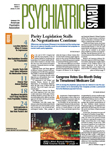Simply serving in a war zone produces stress associated with psychiatric disorders, alcohol abuse, and marital and family conflict, an Institute of Medicine report has concluded.
Risk of accidental death or suicide in the early years after wartime service also increased. The effects were “associated,” but evidence was not sufficient to prove that such deployment caused specific human health effects, said the study.
The report suggested that the armed services assess psychosocial status and psychiatric and medical conditions prior to deployment and also conduct further evaluations right after return from war zones and at about five-year intervals thereafter.
“There are virtually no studies that measured stress at the time of deployment,” said Roberta Wedge, M.S., a senior program officer at the Institute of Medicine (IOM) and the study's staff director. “The committee was frustrated that there were no studies looking at troops before they deployed to determine their medical, psychological, or psychosocial status.”
The Department of Veterans Affairs requested the study of peer-reviewed scientific literature on the relationship between deployment-related stress and long-term, adverse health effects in veterans of the 1991 Persian Gulf War. The IOM committee, chaired by Richard Mayeux, M.D., M.Sc., of Columbia University, sought added perspective by screening 3,000 papers covering veterans from World War II, Korea, Vietnam, and the current wars in Iraq and Afghanistan in addition to the gulf war.
The committee decided that stresses in a war zone went beyond acute combat exposure to include isolation, poor living conditions, heat, cold, sexual trauma, family separation, and exposure to environmental hazards.
“Deployment to a war zone, whether or not combat is experienced, is sufficient to elicit a stress response,” they wrote of their decision to concentrate on comparing deployment versus nondeployment.
Seven primary studies and 11 secondary studies covering veterans of the Vietnam War and the Persian Gulf War found that deployment resulted in greater prevalence of PTSD, anxiety disorders, and major depression compared with veterans who served at the same times but were not stationed in a war zone. In looking at studies of deployed veterans with and without PTSD, the committee found increased prevalence and severity with greater combat exposure or physical injury.
The interaction of deployment with marital and family conflicts was mixed, but appeared particularly strong when the veteran was diagnosed with PTSD.
Evaluating studies on suicide and accidental death was hampered by limitations caused by inconsistent case definition and by a change in the coding of mortality data from ICD-9 to ICD-10 in 1999, although the committee did find an association for both events in the five years following deployment.
Weaker associations were found with drug abuse, chronic fatigue syndrome, gastrointestinal symptoms, skin disorders, fibromyalgia, chronic widespread pain, incarceration, increased reporting of symptoms, unexplained illness, and chronic pain.
Weaknesses in many studies reviewed should serve to guide future researchers, noted the committee. Most of the studies used self-reports for exposure and effects, and nearly all were retrospective, hampering evaluation. Few studies included data on severity of combat exposure or assessed several unrelated exposures, making it hard to determine associations, they said.
“Gulf War and Health: Volume 6. Physiologic, Psychologic, and Psychosocial Effects of Deployment-Related Stress” is posted at<www.nap.edu/catalog.php?record_id=11922>.▪
